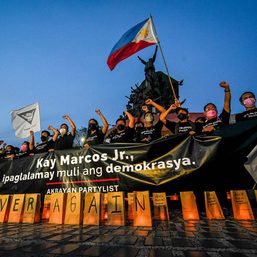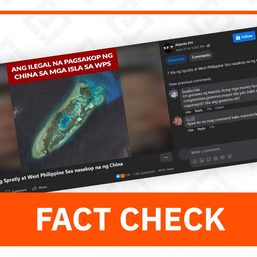SUMMARY
This is AI generated summarization, which may have errors. For context, always refer to the full article.
![[OPINION] ‘Hating’ Corazon Aquino](https://www.rappler.com/tachyon/2023/02/1.jpg)
As we reflect on the February 1986 EDSA People Power revolution that bolstered an entrenched ruling elite, given their numerical superiority during the 2022 presidential elections, the late Corazon Aquino is probably now one of the most disdained.
As someone who inspired a nation to finally get a hold of its economic fate, wrestling it from those who for decades buried us among the swamp cabbage patches, waylaid among the thickets and tall grass where we found ourselves in 1986, Cory Aquino took distinct and definitive steps to return the economy to a path of growth. She did more than negate the immediate past. Her efforts were Herculean given the inertia exemplified not simply by the impossibility of economic recovery from systemic plunder but by the number of violent attempts by recalcitrants to return to the pre-1986 past.
To appreciate the challenges and the bold economic policies she undertook to yank us out of our accursed sinkhole and allow growth to levels that we might again recklessly experiment with our economy, allow us to recall where the economy was during the final fifth of the dictatorship years set against the backdrop of the world economy in the eighties.
For focus, set politics aside. Barbers and beauticians and their uncles are better at analyzing politics. Let us stick to stoic statistics.
What she inherited
Cory Aquino inherited a depression economy deep in debt, pleading for extensions, desperate for moratoriums, and forced to borrow even more to pay for past due indebtedness.
From 1965 when total Philippine debt was merely $600 million, total debt in 1986 ballooned to over $26 billion – an increase of over 4,300%. In the decade prior to 1986, most of the foreign debts were incurred to repay those coming due or were funneled to sectors such as the coconut and sugar agro-industrial enterprises whose specific export revenues, rather than be reinvested in the domestic economy, were deposited offshore, diverted together with capital flight funds.
For reasons only a dirty mind can surmise, the economy back then – lacking in agricultural diversification and rural industrialization strategy – placed inordinate emphasis on sugar and coconut. While both dominated export earnings, in terms of capital plowback, these contributed little to the domestic economy. For proof, simply look where some of the most destitute were. They worked the cane fields and the coconut plantations.
Accelerated capital flight can be tracked by the spiraling reinvested earnings that dove-tailed the economic fall. In the last five months of 1983, over a billion fled the economy. In terms of plain numbers, on the equity column of our national balance sheet, new foreign direct investments (FDI) crashed from 119 in 1983 to 32 and 19 in the last two years prior to the Cory Aquino presidency. We were bleeding profusely, and no transfusions were forthcoming.
These impacted negatively on our current account, a function of export revenues, remittances, and foreign currency savings. Our current account was in an unsustainable deep deficit of over 8% of our gross national earnings. This deficit worsens if we considered GDP as the denominator as this would exclude foreign receipts.
Unfortunately, added to poor tax collections from a domestic recession, it is from these we repay foreign indebtedness. This worsened our balance-of-payments deficit, and furthered a crisis as international markets were increasingly reluctant to lend to a mismanaged economy.
Imagine the victimization inflicted on the public. Inflation was highest at 50.34% in 1984, two years before the dictatorship fell. At the end of Cory Aquino’s first 10 months in office, she reduced this to 1.15%. But imagine the misery of the 11.7% to 12.6% unemployed during the last full year of the Marcos dictatorship when they had to cope with an inflation rate that reduced purchasing power by over half. Do the math. If one had a job, to pay for a product worth P 1.00 one would have to pay over P 2.00.
Ironically, prior to 1986 the global economy surged forward. The planet’s economies grew. We did not. Deja vu. In these last couple of months, as accursed as before, we still continue to trail behind.
Illusory growth
Today, consider our Misery Index that is a function of unemployment and inflation. Sharply skewing our consumer price index northward, our 2023 food inflation, once more due to gross agricultural mismanagement, is highest in the region, bloating faster than any economy similarly affected by negative external factors. Food inflation in Thailand, long considered our economic twin, fell from 8.87% to 7.7%. Ours rose from 10.2% to 10.7%.
Now array our Misery Index against GDP growth. The comparison shows why our 2023 GDP growth is illusory if not meaningless.
Those who abused the economy prior to 1986 might still hate Aquino for displacing them politically. But analyze the economic agenda she pursued to end long-festering misery.
From 1983 onward, on a sharp recovery upswing, the global economy was characterized by falling oil prices, lower inflation, lower interest rates, an increase in trade, lowered tariffs and trade barriers and competing “tiger” economies eager for FDI. It was the perfect stimuli for developing economies and any democracy arising from plunder and dictatorship.
Even as Aquino had been ill-advised to honor dubious debts, she pursued a liberalization and deregulation agenda to attract FDI, thus introducing healthy competition while dismantling oligopolies and cartels to lower prices. She likewise diversified agricultural production and ventured into higher revenue generating products.
Unfortunately, on the flip side, some are now belatedly displeased. Not as vitriolic as hate, it is more a regret. Aquino failed to ensure that never again would we be plundered as we once were. – Rappler.com
Dean de la Paz is a former investment banker and managing director of a New Jersey-based power company operating in the Philippines. He is the chairman of the board of a renewable energy company and is a retired business policy, finance, and mathematics professor.
Add a comment
How does this make you feel?


![[Newspoint] The challenge of unsavory company](https://www.rappler.com/tachyon/2024/02/tl-unsavory-company.jpg?resize=257%2C257&crop=238px%2C0px%2C720px%2C720px)


There are no comments yet. Add your comment to start the conversation.